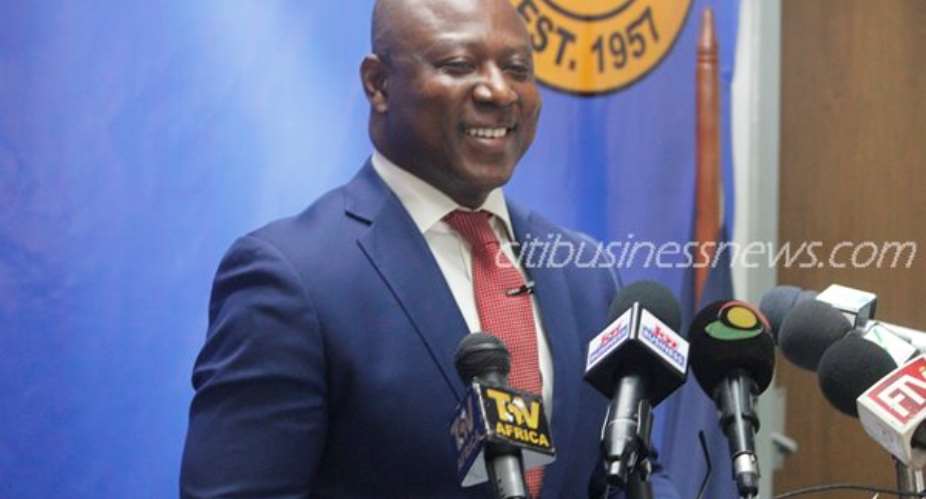The Institute for Fiscal Studies (IFS) has taken a swipe at the Bank of Ghana (BoG) and government for yielding to pressure from the International Monetary Fund (IMF) to roll out zero financing for government’s budget deficit.
According to the IFS it is totally unacceptable to scrap the 10% lending to government from 2016 except in emergency cases.
Speaking to Citi Business News Executive Director of the institute, Prof. Newman Kwadwo Kusi described the move as premature as it is not in the interest of the state.
“Government has an arrangement with the Bank of Ghana where it will support government's deficit to the tune of 10%. When we say it is premature it means that the drastic cut is not in the interest of the state,” he said.
According to him, “whether the bank of Ghana will finance government or not, government will want to run the deficit and so will go to the market and borrow by issuing Treasury Bills to finance its deficit which will see the coupon rate of the deficit going up which may affect interest rate and undermine government's increasing targeting of inflation and policy rate”.
He maintained that in “a country like Ghana you cannot say that the central bank owned by Ghana which is the institution that helps government to raise money to finance government expenditure, will support government at zero”.
He argued that even though there is the need to strengthen the central bank's monetary policy autonomy, it is important that the monetary policy supports the overall policy of government as the elected manager of the economy.
One of the conditions under the IMF Extended Credit Facility (ECF) Program for Ghana, is for the central bank to embark on a zero-financing of government’s budget deficit.
Previously, the BoG Act required that the central bank's monetary financing must not exceed 10 percent of the current year's fiscal revenues. But, consistently, the BoG has not been able to keep to this limit.
The Bank of Ghana until this year financed government's budget deficit which rose to as high as 11.8 percent in 2012, as for instance, domestic borrowing by government amounted to 42.6 percent of total revenues and grants; in 2013 it was 36.3 percent; while in the first three quarters of 2014 it was 14.7 percent.
The economic policy think-tank Institute for Fiscal Studies said that government's performance in the three-year IMF programme could face serious challenges with the medium-term, particularly as its pursues the front-loaded fiscal consolidation on the back of zero central bank financing for government.
Deputy Managing Director of the IMF Min Zhu, said Ghana's implementation performance of the 918 million dollars programme, continues to be “broadly satisfactory but the economic outlook remains difficult with risks tilted to the downside.”
The IMF said while it is encouraging that Ghana's fiscal consolidation efforts are on track and electricity production capacity is gradually being increased, “a wide range of ambitious reforms” would be needed to sustain gains from fiscal consolidation over the medium term including broadening of the tax base and enhancing tax compliance, and enhancing management of the wage bill and public finances.
On public debt, the IMF said that due to Ghana's large financing needs and tight financing conditions, government's medium term debt management strategy is a welcome step but needs to be complemented with efforts to deepen the domestic debt market.
The deal signed between Ghana and the Washington-based lender aims at achieving a single-digit inflation rate over the medium-term, with the support of government's fiscal consolidation. The independence of the Bank of Ghana (BoG) is to be strengthened, with central bank financing of government gradually reduced to zero in 2016.
–
By: Norvan Acqauh – Hayford/citibusinessnews.com/Ghana





 NDC demands complete overhaul of security protocols at EC to safeguard electoral...
NDC demands complete overhaul of security protocols at EC to safeguard electoral...
 Ghana reaches interim deal with international bondholders — Finance Ministry
Ghana reaches interim deal with international bondholders — Finance Ministry
 Mahama to form joint army-police anti-robbery squads to safeguard 24-hour econom...
Mahama to form joint army-police anti-robbery squads to safeguard 24-hour econom...
 Another man jailed eight months over shrinking penis
Another man jailed eight months over shrinking penis
 Ghana to adjust external bond deal to meet IMF debt sustainability goals — Finan...
Ghana to adjust external bond deal to meet IMF debt sustainability goals — Finan...
 IMF negotiations: We've not failed to reach an agreement with bondholders; we’ve...
IMF negotiations: We've not failed to reach an agreement with bondholders; we’ve...
 EC begins recruitment of temporary electoral officials, closes on April 29
EC begins recruitment of temporary electoral officials, closes on April 29
 NPP lost the 2024 elections in 2022 due to inflation and cedi depreciation — Mar...
NPP lost the 2024 elections in 2022 due to inflation and cedi depreciation — Mar...
 Your good heart towards Ghana has changed; don’t behave like Saul - Owusu Bempah...
Your good heart towards Ghana has changed; don’t behave like Saul - Owusu Bempah...
 Wa West: NDC organizes symposium for Vieri Ward Women
Wa West: NDC organizes symposium for Vieri Ward Women
